
| Syncopate! | ||||||||||
JBP's jazz reviews
Page 5.
The New Orleans Ragamuffins Vol 1. Rosazul / INgrooves via Emusic
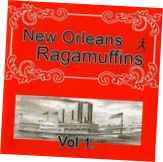
If one day you are wandering with innocence, ignorance and Catalonian expectations through the streets of Barcelona, avoiding if possible the architecture of Gaudi, you may hear in the distance a series of inspiring, inspiriting and unlikely sounds. Can it be? No, surely not? I must be going slightly diffy, touched by the sun and the loss of my wallet. But the sounds continue. They grow louder. It's true! It's here! It's jazz! I must break into a shambling run. to arrive at the source of the noises before they vanish into the realm of Fairies where celebration never stops and the years pass in a minute. The noises are live, bouncing, unabashed, boisterous New Orleans jazz played with love, verve and vitality. In Barcelona! There they are four of them, outside the Hardrock Cafe, making the feet tap, the legs twitch, the hair rise on sad bald heads, the sick shimmy and the grim cackle, calling the faithful to rejoice - the Barcelona New Orleans Ragamuffins at work and play.
The CD described above and below allows us to hear the Ragamuffins in full flight without having to sacrifice all our possessions to some ravening airport run by goblins.
If the word Quartet conjures up the spectacle of four men dressed as civil servants rising to bow soberly after scraping Ligeti, banish the thought. Here we have trumpet, clarinet, piano and banjo played with enough pep, fullness of tone and intuitive ability to sound as rich as a vigorous eightsome.
There's more astonishment to come. The four of them are as international as an English football team: one Spaniard (trumpet), two Russians (Piano and banjo), and a British girl playing fresh and sprightly clarinet. And they look young!
The tunes on the CD are all standards - if you include Ja-Da and Sweet Georgia Brown in that category - but played with an enjoyment and character which creates them anew. There are occasional bursts of strangled singing in a variety of extravagant accents, which become an interesting puzzle: are they vocalising in American, Russian or some tongue known only Jazzalonians? An imaginary prize will not be awarded to successful interpreters.
(This Album can be sampled and downloaded from Emusic)
![]()
Sammy Rimington, Fred Vigorito and The French Preservation New Orleans Jazz Band, "Memories of Kid Thomas".GHB Records BCD-499
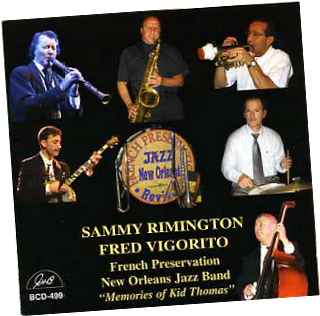
Real jazz needs an injection from time to time. We don't want it retired, expired or lost in the supermarket. here's a refreshment, recorded in France, the year 2000.
The line-up is more or less accidental and oddly satisfying: Sammy Rimington, clarinet and John-Handy-style alto saxophone, taking off and flying: Fred Vigorito, trumpet: Pierre Alessi, bouncy tenor sax: banjo, brass and drums. No trombone: good. All that's missing is Bill Sinclair on piano.
They don't go for a list of well-known standards, but relish and ravish melodies which appealed to them on their way. The result is fresh and vigorous; they jump, drive, celebrate, each player failing to out-do the others.
They might even wake the dead. At one moment I thought that I heard the dead dancing. They certainly encourage the living.
Give them a go. Life isn't over yet.
JBP
20th February 2008
![]()
Original Salty Dogs. On the Mississippi Vol.1 GHB records BCD-493

Players:
Lew Green, cornet;
Tom Bartlett, trombone;
Kim Cusack, clarinet;
John Cooper, piano;
Jack Kunki, banjo;
Mike Walbridge, tuba;
Wayne Jones, drums;
Carol Leigh, singer.
The Salty Dogs were a Chicago group, formed in 1947,playing music based on the jazz of the 1920s,and they quickly learned to drive with the hard edge of the revivalist Yerba Buena Jazz Band
That outfit is the one they most resemble. This is a reissued and remastered CD of tracks recorded in 1980.Over and above these influences, they have a distinctive character of their own, and spring some refreshing surprises.
They give rare prominence to the tuba/which jumps like a fat man on a trampoline; the pianist plays with great versatility; the trombone shows lively growling relish; the cornetist blows on his way without feeling the need to sound like Louis Armstrong.But there's a special reason why I'm reviewing this CD - their wonderful rendering of Ma Rainey's 'Misery Blues.'
Tact, sensitivity, and grace are not words often applied to a traditional jazz band, but this track displays all these in a remarkable harmony duet between trombone and the voice of Carol Leigh. It has the effect of making you listen again with awakened ears, and then give thanks to the mystery of jazz. In 'Misery Blues', as well as the magic of voice/trombone, the tuba dances like an inspired elephant in springtime.The CD would be worth buying for 'Misery Blues' alone,even if all the other tracks were just the usual stuff. But they're not. The band plays an inspiritingly jaunty version of 'Dallas Blues', and the tuba grunts in all the right places in 'Olga', as well as bouncing through an avuncular solo.
They make a bit of a mess of several Jelly Roll Morton tunes but you can't have everything, as the burglar said to the banker, and on the whole this is a band at ease with itself, which knows where it's going and enjoys the journey.
JBP Jun '07
![]()
The Jazz O'Maniacs. Sunset Cafe Stomp. Delmark Records-DE-244.
Recorded 2005. Issued 2007.
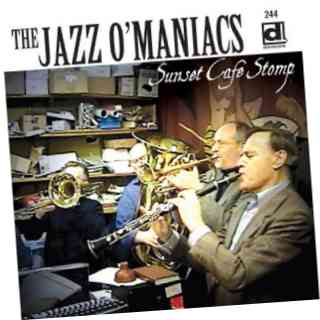
Players:Roland Pitz, cornet ;
Claus Jurgen Moller,clarinet;
Ullo Bela, trombone ;
Christoph Ditting,alto and tenor sax;
Andreas Clement,piano;
Owe Hansen,banjo;
Dietrich Kleine-Horst,tuba;
Gunther Andernach,washboard.
In the film 'Pinocchio' two men are walking together down busy street when one remarks casually, 'Look, a wooden boy' and they proceed on their way. A few yards later and, stricken to a stop, they wheel round crying in unison: 'A wooden boy!'There might be a similar reaction when two innocents encounter a real live German Jazz band. 'A German Jazz Band!' yes, real, live and stomping. There are, after all, still pooting in the world, several hundred British jazz bands, French jazz bands, Danish, Swedish, Dutch jazz bands, and even an Italian jazz band of considerable accomplishment, not to mention a few surviving American jazz bands despite the floods in New Orleans.
The jazz band on this CD was summoned to the U.S.A. to participate in the Bix Beiderbecke Festival of 2005. They didn't play Beiderbecke or anything like Beiderbecke but they played jazz with great elan, skill and devoted enthusiasm. The Jazz O'Maniacs were formed in 1966 and have been engaging seriously with the music ever since. The leader and cornet player is a follower of Louis Armstrong and the clarinet player of Johnny Dodds, but I'll come to that later. They play with the precision of the Yerba Buena jazz band in its heyday, but with a joyful freshness of their own and every one of the participants is a skilled musician in his own right.
Note too that the line-up is not the usual New Orleans cliche of trumpet, trombone and clarinet. There is not only a piano, which is common enough, but an accomplished sax player who puts welly into his solos, a tuba, getting rare, and a washboard, very unusual except in specialised 1920s units like those smuggled into studios by the great Jimmy Blythe, and the vaudeville goings-on of Clarence Williams.
The cornetist plays occasional solos directly from Armstrong and the clarinetist from Dodds but both are innovators in their own way and the unit as a whole has a unique sound with interactive driving climaxes which endanger low-flying aircraft.
Roland Pitz is a remarkable player with a blazing golden tone and he can drive the band or soar above it, while the clarinetist plays with the Dodds emotional intensity without drowning.
I'm grateful for being introduced to the O'Maniacs, who are anything but, and after listening to the CD have the feeling that something significant has happened - in other words, it's real music.
My only regret is that Pilz finds it necessary to sing, and when he does so, to sing like Louis Armstrong. It's only decent to leave Louis his own gravel.
JBP
![]()
Bunk Johnson. Volume 1 'New York'.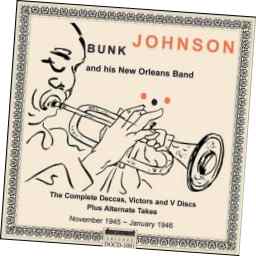
The Complete Deccas, Victors and V Discs. November 1945-January 1946
Document Records DOCD-10012005.Bunk Johnson, trumpet;
George Lewis, clarinet;
Jim Robinson, trombone;
Alton Purnell. piano;
Lawrence Marrero, banjo;
Alcide 'Slow Drag' Pavageau, bass;
Baby Dodds, drums.
(Dodds is replaced by the mysterious 'Red' Jones on 2 numbers out of 22.)
Yes yes, we know that Bunk Johnson was not only thrawn, quarrelsome and drank too much, and at this recording in1945, after having been rescued from his job as truck driver and supplied with new teeth and a trumpet, loudly despised all the other musicians on the session. According to Al Rose in 'I Remember Jazz' Bunk remarked that Jim Robinson 'don't know but three changes and he don't always make THEM in the right place' and charged George Lewis with knowing 'how to play a little blues an' that's all.' He also insisted that people want 'new tunes', 'they don't want to hear those old numbers every time.' The ardent fans of the 1940s Jazz revival would have been shocked and astonished to hear such heresy, but Bunk had a point, which applies today.
This reissue of the so-called 'Bunk Johnson and His New Orleans Band' recorded in 1945/6 and reissued by Document Records in 2005, enables us to remind ourselves not only of the band, but of Bunk's own stature as a trumpet player, which is rarely discussed. And it's vital.
Well, the CD surprised me with a feast of wonderful stuff. The group of feuders and strangers play as if they have been good friends for twenty years, co-operating with intuitive sympathy and driving on with unflagging vigour. This despite the fact that Bunk had hardly played serious trumpet since 1931 and Purnell's piano needs a service by a tuner of genius.
Bunk plays with relentless purpose and a pure tone somewhere between brass and steel, usually in short staccato bursts, but soaring when he wants to fly above mere music. He never seems to mop his brow or rest his new teeth.
In 'One Sweet Letter From You' Bunk and Lewis show mutual respect and perfect balance in a natural demonstration of the power of music. 'I Can't Escape From You' and 'Tishomingo Blues' are almost as good. Note that two of these three are 'new tunes' played with all the stored memories and knowledge of fifty years of New Orleans tradition.
I must add here that Bunk was wrong about the accomplished George Lewis, whose clarinet style can be sweet-toned and director flowery at will, and has proved a profound influence on both Brian Carrick and Sammy Rimington, two luminaries in today's jazz scene on this odd-shaped and endearing island.
JBP
![]()
Jimmy O'Bryant, Mystery Man of Jazz. Frog: DGF51
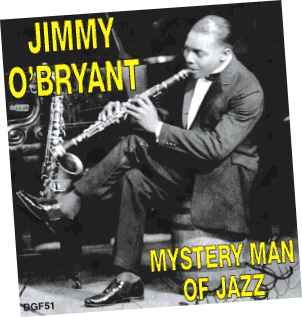
Jimmy O'Bryant was a clarinet prodigy of excruciating squeakiness and preposterous agility and verve. He reminds me of Ted Lewis and the vaudeville practitioners, and could even be said to resemble Johnny Dodds, without his passion and richness of tone. Like Dodds he played with the long dead but immortal pianist Jimmy Blythe, who seems to have been responsible for dragging lost musicians into recording studios where they kept tiny band music rattling along throughout the early twenties. These groups were brisk, lively and so minuscule as to be cheap.
O'Bryant shrilled away, too, with trumpeter Tommy Ladnier and Bob Shoffner in the band known as Lovie Austin's Blues Serenaders, for which I have an irrational fondness. They recorded the irresistibly charming Too Sweet For Words in 1925. It's a tune I can't play without smiling; but you'd have to get a Lovie Austin CD to hear that.
The music on this one is recorded as Jimmy O'Bryant's Washboard Band and consists entirely of O'Bryant as soloist backed by Blythe and a washboard, except for a few tracks on which Shoffner darts in for a short tootle.
Blythe is just going through the motions at these sessions, making very few bursts on his own, so we are left with O'Bryant, whose squawking, eldritch adventures are certainly fun but can grow wearing after a while. You may find it necessary to pause for a cup of tea. When you've recovered, and try again, you'll be amazed at the sheer skill of this master of the inspired squeal, who died in his early thirties of drinks much stronger than tea, and thank Frog for causing a resurrection.
JBP Nov '07
![]()